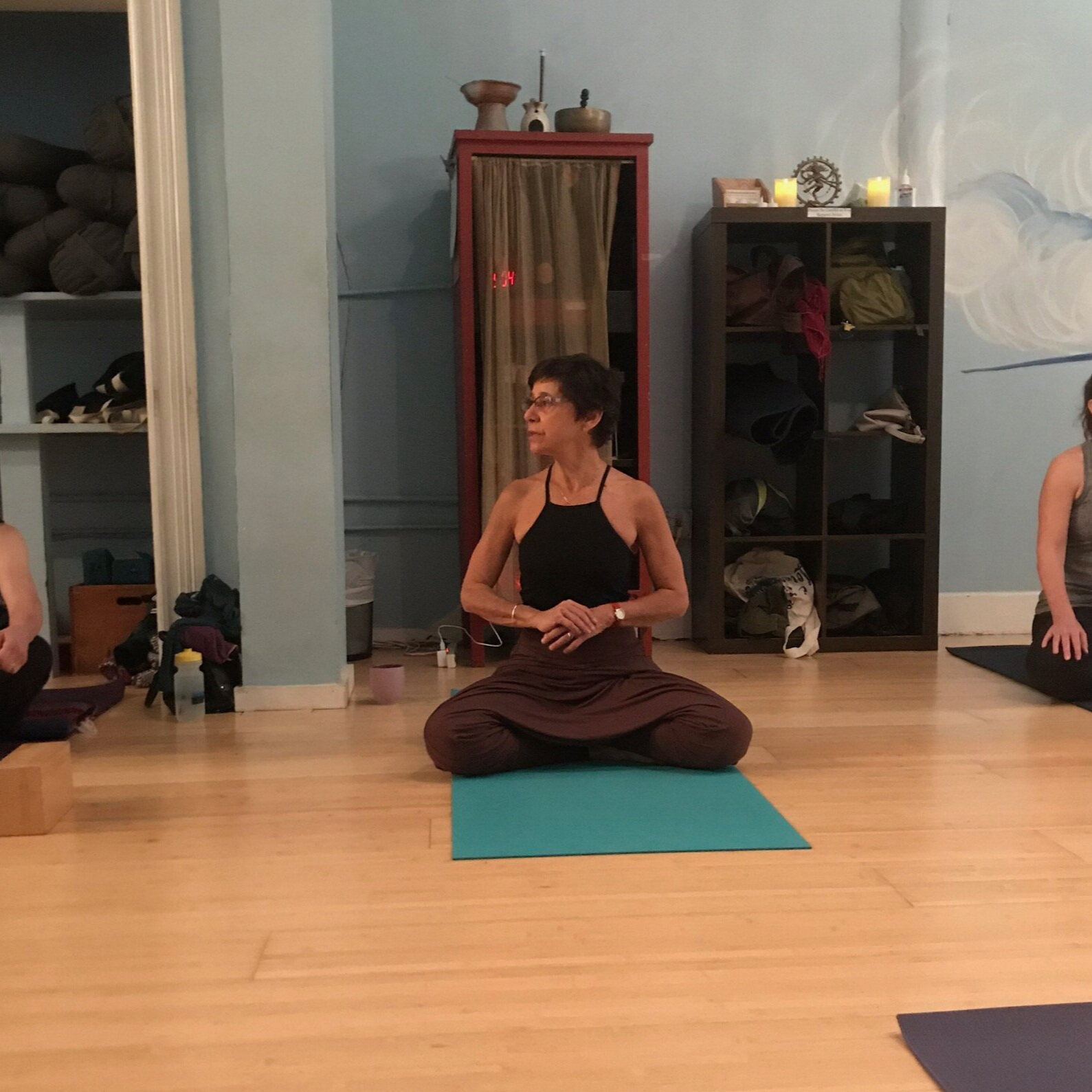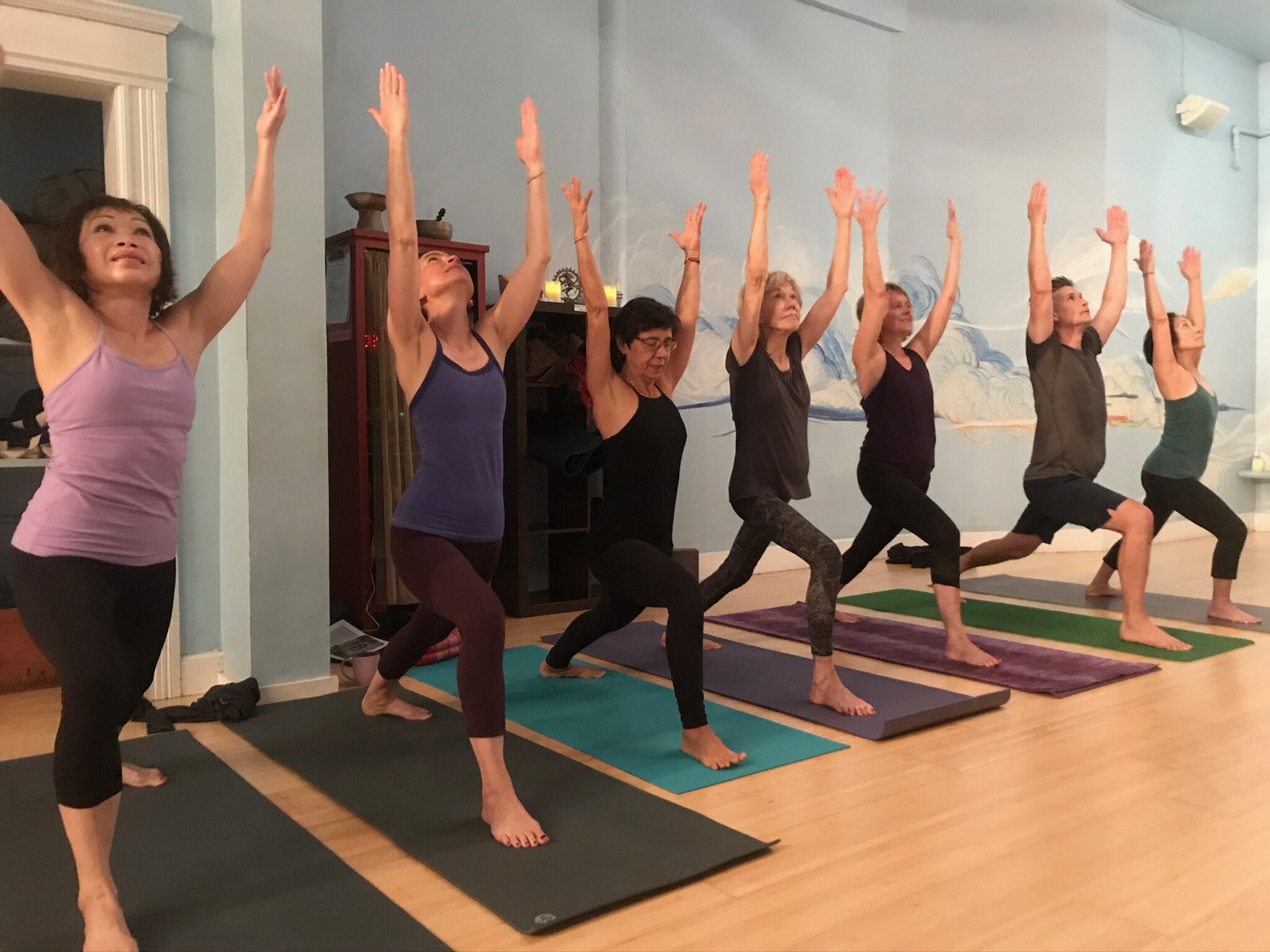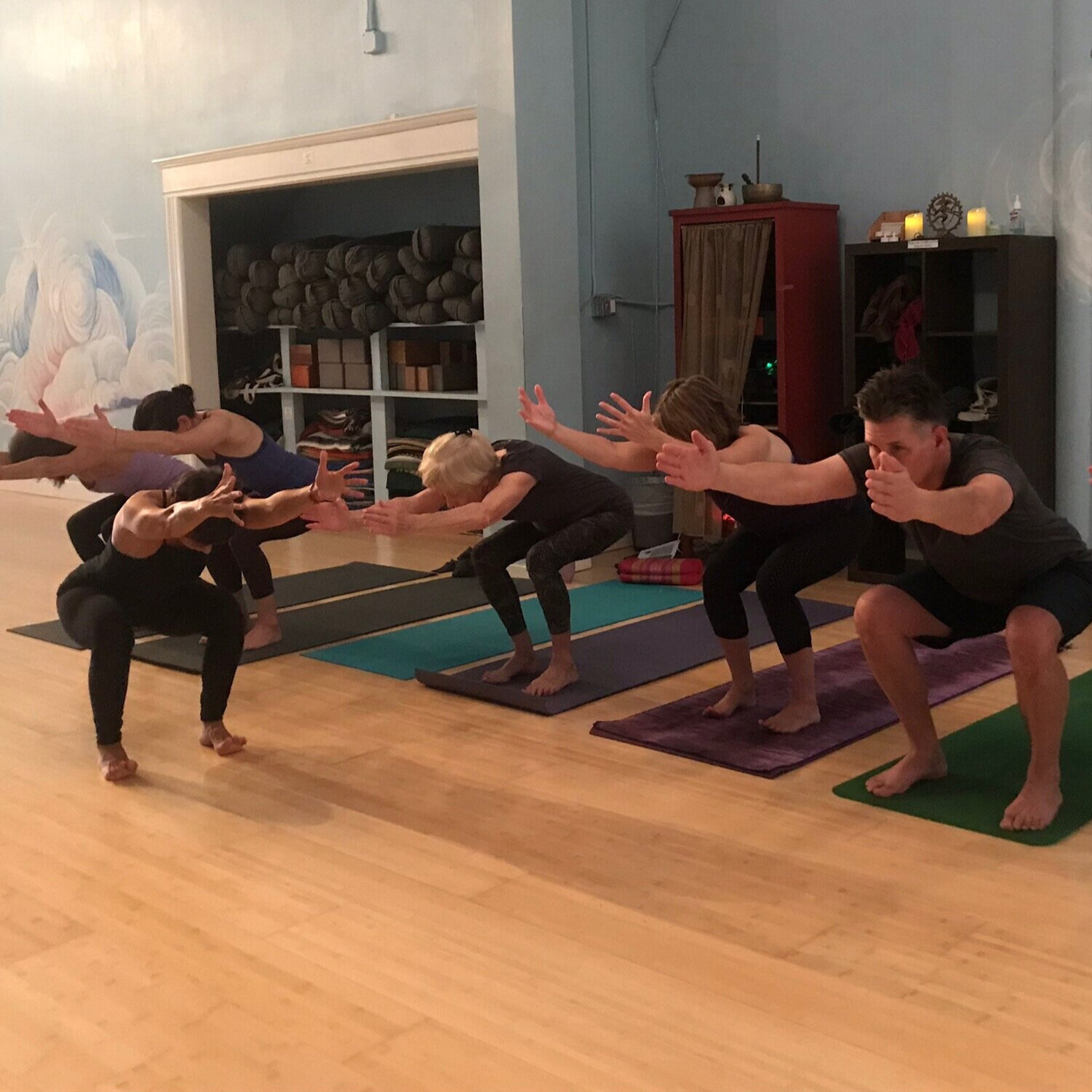In ninth and final installment of our interview, yoga teacher Charu Rachlis discusses her deep alignment with and lack of attachment to her role as a yoga teacher, and explores what might be next for her.
Sarah: What is the best part of teaching yoga?
Charu: Oh my gosh, the joy, love, and friendship I receive––this beautiful heart exchange that happens effortlessly. As I said earlier, I’m a shy person. I choose to spend a lot of my time quiet and alone. But when I step into that arena of teaching, I’m not focusing on myself. I feel natural in that role.
Sarah: It seems like you already feel deeply fulfilled. What are you curious to experience in the next phase of your life?
Charu: That’s my question for myself right now. I’m 62. Since I turned 60, I’ve been noticing subtle changes in my body, manifestations of the aging process. I feel the changes and I see them too. I’m not in a fight with this process. It’s nature. I love nature, and I learn from it.
I’ll see what resonates. I don’t have a lot of clues yet, but I trust that my next steps will make themselves known when the time is right. One idea is to offer yoga classes for people ages 50 and over, so I can share this exploration of the aging process with others. I also imagine living closer to nature and having a dog or two.
Sarah: What do you wish most for yourself?
Charu: I am so honored to have been given the opportunity to teach for the past 25 years and I hope to continue this amazing journey. But if my path changes and at some point I stop teaching yoga, that’s OK, because I know the teacher role isn’t my essence. Ultimately what I wish is that no matter how my life transforms, I continue to open to clarity, love, and truth, more and more over time. That’s my wish for myself.
-
August 2021
- Aug 31, 2021 The Heart Is the Major Target—Part 9: The Teacher Role Isn't My Essence Aug 31, 2021
-
June 2021
- Jun 13, 2021 The Heart Is the Major Target—Part 8: Machines Spilling Out Teachers Jun 13, 2021
-
April 2021
- Apr 14, 2021 The Heart Is the Major Target—Part 7: A Waterfall of Inspiration Apr 14, 2021
-
February 2021
- Feb 14, 2021 The Heart Is the Major Target—Part 6: Grab the Right Computer File Feb 14, 2021
-
December 2020
- Dec 26, 2020 The Heart Is the Major Target—Part 5: Yoga Is My Second Child Dec 26, 2020
-
November 2020
- Nov 5, 2020 The Heart Is the Major Target—Part 4: Wow, This Is Me Nov 5, 2020
-
October 2020
- Oct 4, 2020 The Heart Is the Major Target—Part 3: In Exile in My Own Country Oct 4, 2020
-
August 2020
- Aug 23, 2020 The Heart Is the Major Target—Part 2: Openness to the Unseen Aug 23, 2020
- Aug 2, 2020 The Heart Is the Major Target—Part 1: Let's Move Around; We'll Feel Better Aug 2, 2020
-
July 2020
- Jul 25, 2020 Educator Wellness Series Conclusion: Moving Forward with Wellness Jul 25, 2020
- Jul 6, 2020 Educator Wellness Practice #10: Inhabiting the Dignified Stance of "Adequate" Jul 6, 2020
-
June 2020
- Jun 17, 2020 Educator Wellness Practice #9: Jun 17, 2020
- Jun 3, 2020 Educator Wellness Practice #8: Reducing Stress Through Body Scanning Jun 3, 2020
-
May 2020
- May 21, 2020 Facebook Live Event: A Conversation About the Impact of Saying Goodbye to Students May 21, 2020
- May 13, 2020 Educator Wellness Practice #7: Setting Intention and Letting Go of Results May 13, 2020
- May 6, 2020 Educator Wellness Practice #6: Practicing Goodwill as Self-Care May 6, 2020
-
April 2020
- Apr 29, 2020 Educator Wellness Practice #5: Dealing with Constant Change Apr 29, 2020
- Apr 22, 2020 Educator Wellness Practice #4: Listening to Silence Apr 22, 2020
- Apr 21, 2020 Facebook Live Event: A Conversation About the Importance of Self-Care Apr 21, 2020
- Apr 15, 2020 Educator Wellness Practice #3: Apr 15, 2020
- Apr 8, 2020 Educator Wellness Practice #2: Engaging Wisely with News and Media Apr 8, 2020
- Apr 1, 2020 Educator Wellness Practice #1: Breathe ... Keep Breathing Apr 1, 2020
-
March 2020
- Mar 25, 2020 Educator Wellness Series for Collaborative Classroom Mar 25, 2020
-
May 2019
- May 19, 2019 Managing to Build Bridges - Part 8: Do We Want to Be Right in a Dictionary Sense? May 19, 2019
-
April 2019
- Apr 27, 2019 Managing to Build Bridges - Part 7: You Just Need to Find a Good Husband Apr 27, 2019
- Apr 6, 2019 Managing to Build Bridges - Part 6: Human Remains and Cultural Artifacts Apr 6, 2019
-
March 2019
- Mar 17, 2019 Managing to Build Bridges - Part 5: Poetry Has No Rules Mar 17, 2019
- Mar 3, 2019 Managing to Build Bridges - Part 4: Dessert Goes to a Different Stomach Mar 3, 2019
-
January 2019
- Jan 13, 2019 Managing to Build Bridges - Part 3: I Felt Pretty Stupid Jan 13, 2019
-
December 2018
- Dec 9, 2018 Managing to Build Bridges - Part 2: Such a Bad Kid Dec 9, 2018
-
November 2018
- Nov 23, 2018 Managing to Build Bridges - Part 1: The Pressure to Be a Certain Type of Girl Nov 23, 2018
-
October 2018
- Oct 23, 2018 Leadership Without Ego - Part 6: Mayberry with an Edge Oct 23, 2018
- Oct 1, 2018 Leadership Without Ego - Part 5: Everyone Everywhere Deserves to Make Art Oct 1, 2018
-
September 2018
- Sep 10, 2018 Leadership Without Ego - Part 4: I'm About Ready to Swear Sep 10, 2018
-
August 2018
- Aug 19, 2018 Leadership Without Ego - Part 3: The Dalai Lama Breaks All the Rules Aug 19, 2018
-
July 2018
- Jul 29, 2018 Leadership Without Ego - Part 2: The Kids Melted Under That Praise Jul 29, 2018
- Jul 10, 2018 Leadership Without Ego - Part 1: The Workshop Was Neutral Territory Jul 10, 2018
-
May 2018
- May 26, 2018 The Alchemy of Service - Part 5: Watch Out, Someone's Behind You May 26, 2018
- May 6, 2018 The Alchemy of Service - Part 4: Fireworks and Tears May 6, 2018
- May 5, 2018 The Alchemy of Service - Part 3: Joann Wong! You Are Chinese! May 5, 2018
-
April 2018
- Apr 6, 2018 The Alchemy of Service - Part 2: Mom, It's Only a Nickel Apr 6, 2018
-
March 2018
- Mar 19, 2018 The Alchemy of Service - Part 1: Mouse Soup Mar 19, 2018
-
February 2018
- Feb 18, 2018 Back to the Garden - Part 4: Mountain Lion Footprints on the Deck Feb 18, 2018
- Feb 3, 2018 Back to the Garden - Part 3: "You're a Good Egg—Happy Easter" Feb 3, 2018
-
January 2018
- Jan 15, 2018 Back to the Garden - Part 2: "A Pretty Big Failure" Jan 15, 2018
- Jan 1, 2018 Back to the Garden - Part 1: "Aesthetic Shock" Jan 1, 2018
-
August 2017
- Aug 15, 2017 Goodbye Self-esteem, Hello Self-compassion – Part 3: Real Love Aug 15, 2017
-
July 2017
- Jul 31, 2017 Goodbye Self-esteem, Hello Self-compassion – Part 2: Mirror, Mirror Jul 31, 2017
- Jul 17, 2017 Goodbye Self-esteem, Hello Self-compassion – Part 1: Bashing Vasco Jul 17, 2017
-
May 2017
- May 28, 2017 This Thing I Found: Teens Teach Us How to See Freshly May 28, 2017
-
March 2017
- Mar 20, 2017 Dream On - Part 6: Dream Analysis Example Mar 20, 2017
- Mar 7, 2017 Dream On - Part 5: A Dream Analysis Technique (cont.) Mar 7, 2017
-
February 2017
- Feb 20, 2017 Dream On - Part 4: A Dream Analysis Technique Feb 20, 2017
-
January 2017
- Jan 22, 2017 Dream On - Part 3: Recording Dreams Jan 22, 2017
- Jan 15, 2017 Dream On - Part 2: Dream Recall Jan 15, 2017
-
December 2016
- Dec 30, 2016 Dream On – Part 1 Dec 30, 2016
- Dec 12, 2016 Enjoying the Ride of Serendipity Dec 12, 2016
- Dec 6, 2016 Agnes Martin: A Singular Career Dec 6, 2016
















